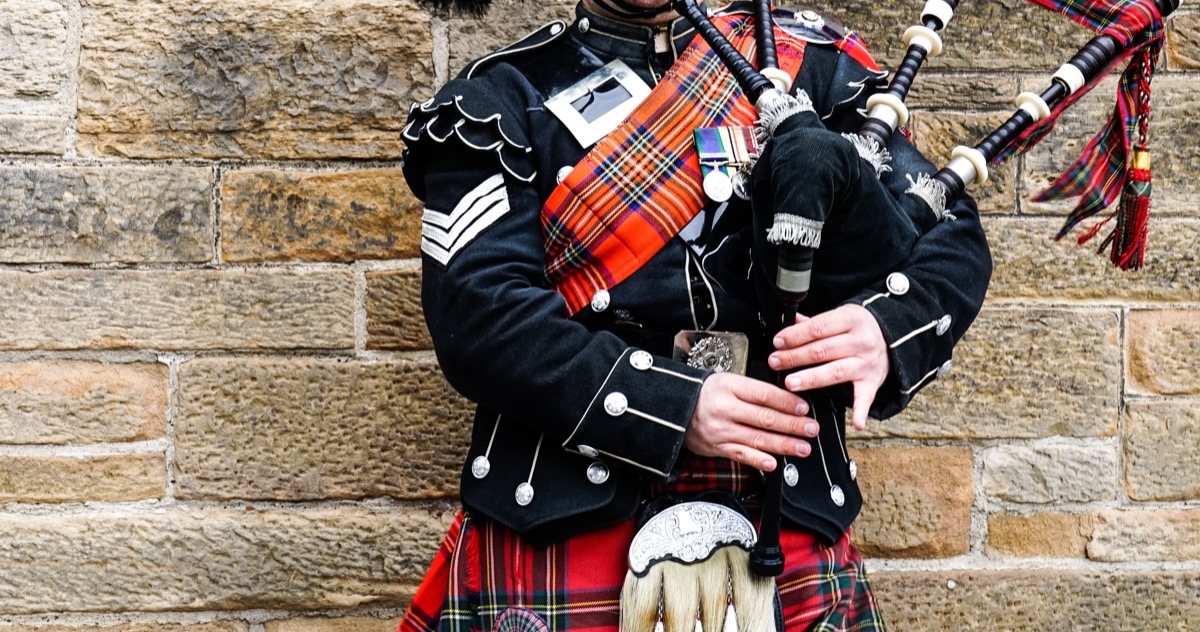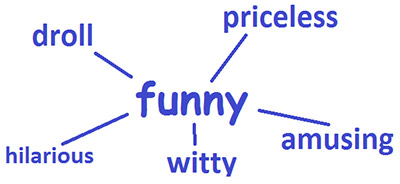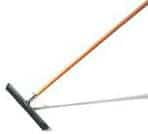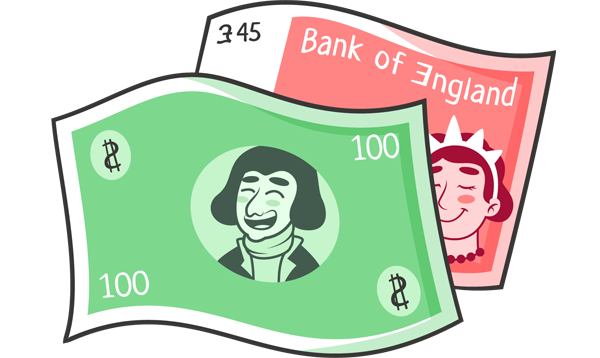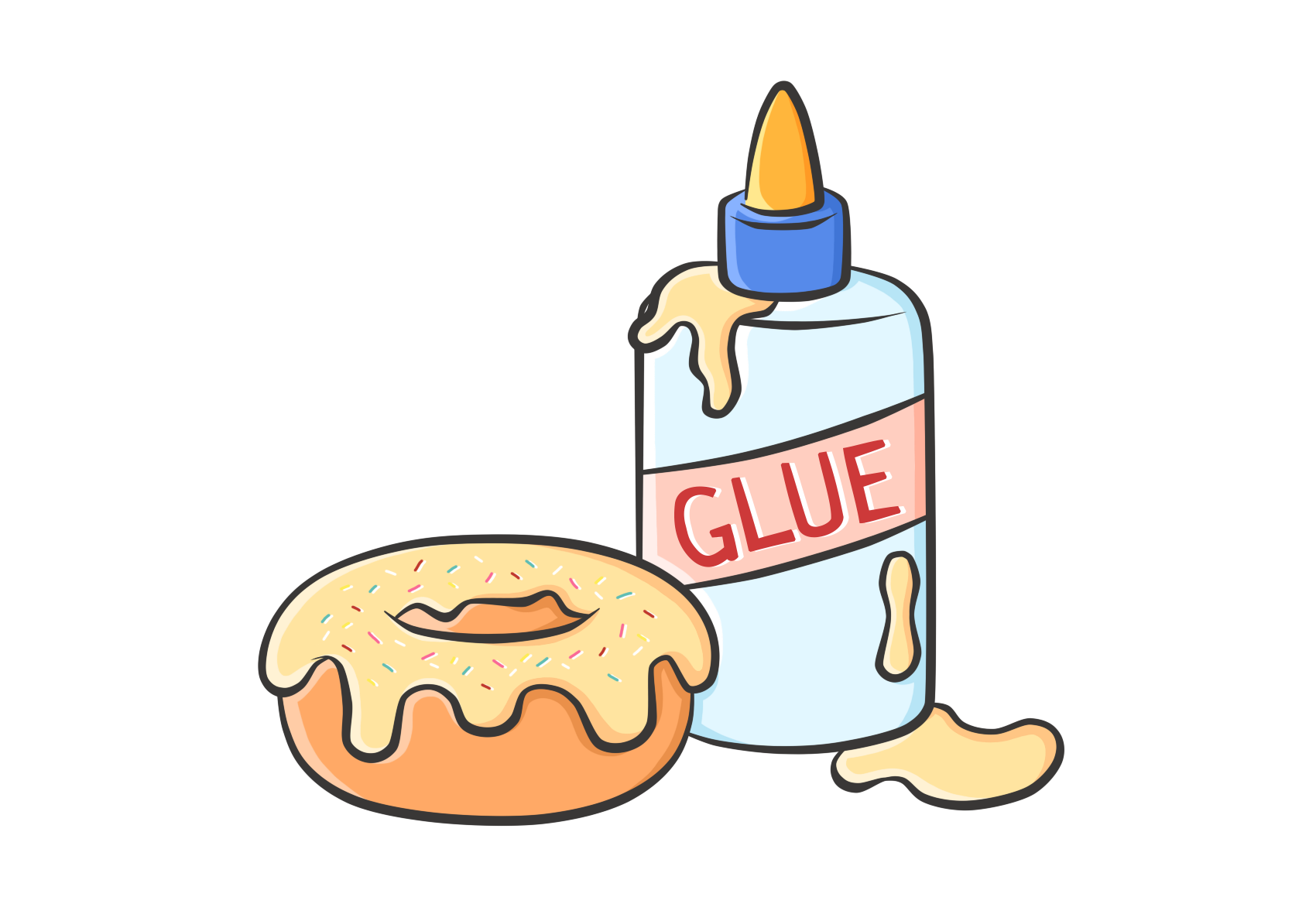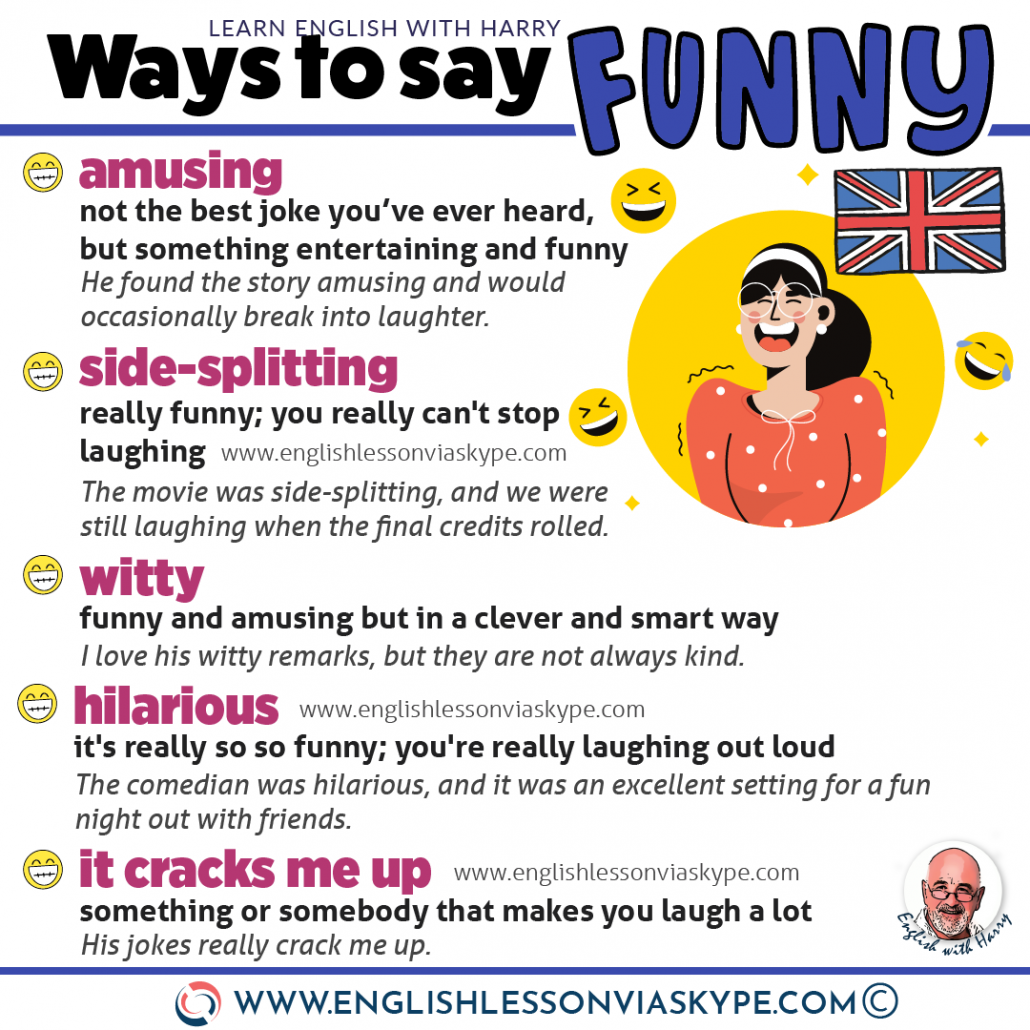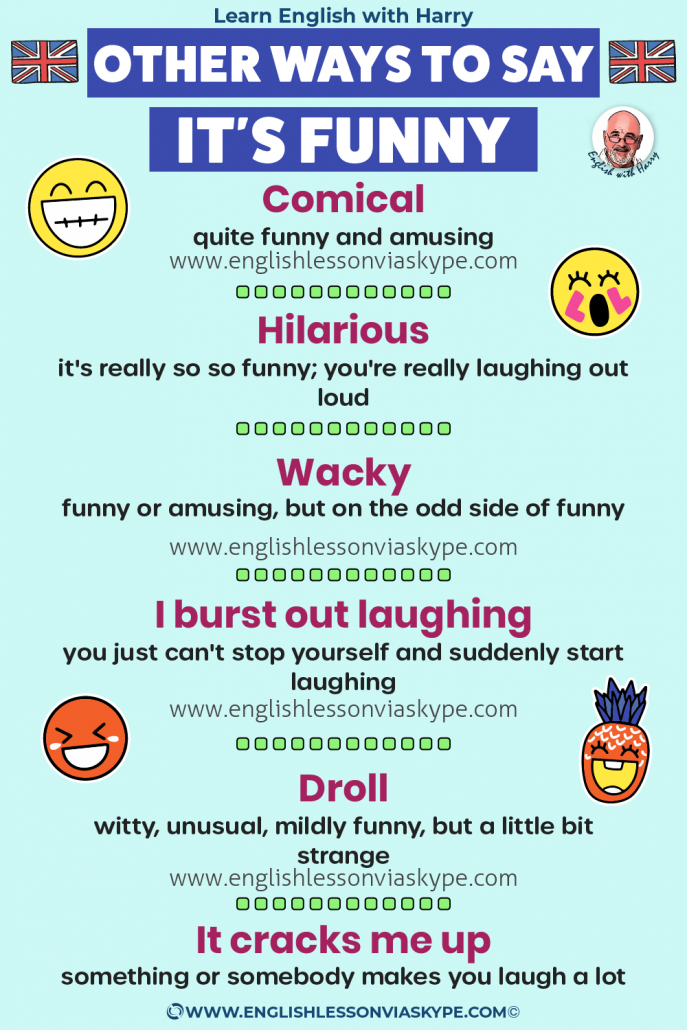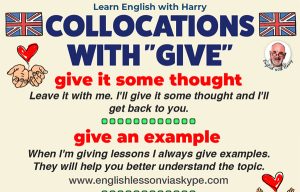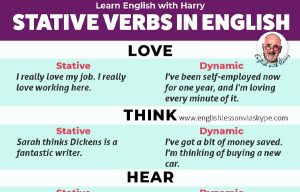Did you know the English language is the most complicated language to learn as a second language (Japanese is a close second)? Not so surprising when you think about words like, they’re, there and their. And not to mention the confusing plural nouns, like goose is geese, but moose as a plural is moose. To celebrate the beauty, the sophistication and the history of the English language there is even a holiday on April 23rd each year named English Language day (which is also William Shakespeare day – The famous English writer). While there are millions of brilliant words in the English Language, today we look at over 100 of the funniest words in the English language. I hope you love them, as much as I do!
Funny Words starting with A:
- Abibliophobia: The fear of running out of reading materials to read.
Sentence: I have so many reading materials in my house, anyone would think that I have Abibliophobia or something!
- Abozzo: A rough sketch of a drawing or a draft poem.
Sentence: I’m almost finished with my abozzo of the Eiffel tower.
- Ama: Japanese diver who dives for pearls or food.
Sentence: Amas have been diving for pearls in the Japan region for many years.
- Araba: A carriage or coach used in Turkey.
Sentence: I’m taking the araba through the city today.
- Argle-bargle: A lot of commotion or a row happening.
Sentence: What’s all this argie-bargie about?
- Aye-aye: A type of lemur which can be found in Madagascar.
Sentence: The aye-ayes are such cute little creatures.
Starting with B:
- Bamboozled: To trick or confuse someone.
Sentence: I have been bamboozled again by you.
- Blubber: This word has two meanings: It can mean to cry very loudly or could refer to excess body fat.
Blubber Sentence: Please, stop your blubbering.
- Brouhaha: An event which involves great excitement or loud confusion.
Brouhaha in a sentence: Last night’s event was such a brouhaha and nothing was achieved.
- Bumbershoot: A Bumbershoot is an old-fashioned word for an umbrella.
Bumbershoot in a sentence: Don’t forget your Bumbershoot, dear.
- Bumfuzzle: This refers to being confused.
Bumfuzzle in a Sentence: I’m completely bumfuzzled!
Starting with C:
- Cantankerous: Someone who is very grumpy.
Sentence: Our neighbour is such a Cantankerous.
- Catawampus: Something positioned diagonally.
Sentence: To get to the school, you need to walk catawampus across that park over there.
- Collywobbles (kol-ee-wob-uh lz): This is the feeling when you have a stomach ache or when you feel really nervous or scared.
Collywobbles in a sentence: This place gives me the collywobbles, let’s go!
Hilarious Words Starting with D:
- Dingy: Something that is dark and dull.
Sentence: This house looks a little dingy to me.
- Donnybrook: This refers to a fight, riot or a big brawl.
Donnybrook in a sentence: A Donnybrook broke out last night when the police when to arrest the leader of the operation.
- Doozy: Something that is really great.
Sentence: I’m having a doozy of a time at this party.
- Dweeb: This is not a nice word to call someone. It means that you think the person is boring and uninteresting.
Sentence: No-one wants to be a dweeb.
Funny Words That Start With E:
- Egad: Used as an expression of shock or amazement.
Sentence: Egad! I never thought of that!
- Eep: Another expression of surprise or fear.
Sentence: Eep! That was scary!
- Epos: Could refer to an epic poem or something that is epic.
Sentence: That poem was just epos!
Starting with F:
- Filibuster: Somone who refusing to give up the floor in a debate to prevent a vote.
Sentence: Someone get that silly filibuster out of here now!
- Flibbertigibbet (flib·ber·ti·gib·bet): Is a word used to describe someone who talks a lot or is very gossipy.
Flibbertigibbet in a sentence: Imagine sitting on a 12-hour flight with a flibbertigibbet next to you.
- Flabbergasted: To be surprised or shocked by something.
Sentence: I’m just flabbergasted to hear that.
- Formication: The feeling that ants are crawling on your skin.
Sentence: Her constant shivering could be described as a formication.
- Fuddy-duddy: Someone who is a mild-mannered person.
Sentence: He can be such a fuddy-duddy sometimes.
Starting with G:
- Gaberlunzie: A beggar that walks around town to town.
Sentence: He didn’t really have a profession, some may even call him a gaberlunzie.
- Gardyloo (gahr-dee-loo): This is a disgusting one. It refers to the cry people use to shout when they would throw their slops or droppings out of the window.
Gardyloo in a Sentence: Watch out, Gardyloo coming!
- Gazump: This word really has a specific meaning. It means to refuse to sell your house to someone who you previously agreed to sell your house to.
Sentence: I’m so happy my offer to buy the house next door was accepted, but what if I get gazumped?
- Gobbledygook: Speaking Nonsense.
Sentence: Why do you always have to speak such Gobbledygook?
- Goombah: An older friend who protects you.
Sentence: Jamie didn’t have many friends, but was glad that his grandpa could be his protector – His Goombah.
- Gubbins: These are objects of very little value like rubbish or litter.
Gubbins in a sentence: No one’s going to buy your gubbins.
Starting with H:
- Hairball: A ball of hair that a cat normally chokes out.
Sentence: Cats are cute, but I hate it when they throw-up hairballs everywhere.
- Hocus-pocus: A trick or magical spell.
Sentence: What’s all this hocus-pocus about?
- Hokey: Something is is silly or old-fashioned.
Sentence: Now that was hokey old movie to watch!
- Hootenanny: A country music party or get-together.
Sentence: I’m going to an old-fashioned Hootenanny on Saturday, would you like to come?
- Heckler: Someone who interrupts a public performance with offensive comments.
Sentence: Those footballers are always having to deal with hecklers at their matches.
Starting with I:
- Itty-Bitty: Something that is really small or tiny.
Sentence: That ladybird is so itty-bitty.
- Ickle: Something that is small and normally cute
Sentence: Look at that ickle baby dolphin!
- izzat: This relates to your personal respect and dignity.
Sentence: I’m afraid of saying that in public, as it’ll be against my izzat.
Starting with J:
- Jabberwock: Something that is complete nonsense or gibberish
Sentence: Everything he just said was complete Jabberwock.
- Jazzetry: The reading of poetry which is accompanied by jazz.
Sentence: I love reading poems, but I’ve never tried jazzetry.
- Jink: The sudden change in direction.
Sentence: He jinked out of the way, as the ball came towards him.
Fun Words Starting with K:
- Kagu: An blueish-greyish type of bird which is now an endangered species.
Sentence: The rare Kagu can be found in the Pacific island of New Caledonia.
- Kaka: A breed of parrot that can be found in New-Zealand.
Sentence: The kaka parrots are so cool!
- Kebbie: A Scottish term relating to a walking stick with a hooked end.
Sentence: Pass the old man his keebie.
- Kibble: Ground meal or gains used as animal feed.
Sentence: The chickens love this new brand of kibble.
- Kraken: A mythical sea creature.
Sentence: Just like the loch ness monster, the Kraken is a myth.
Starting with L:
- La-di-da: If you described someone as “La-di-da”, you are suggesting that they are upper-class or behaving unnaturally only to impress other people.
La-di-da in a sentence: She thinks she is all La-di-da, but I know what she’s really like.
- Lol: Short for laughing out loud. Mosting used on social media and in text messages.
Sentence: Lol – That’s so funny!
- Lollygagger: Someone who walks around with no aim or goal.
Sentence: They spent their summer lying about, eating and general lollygagging.
- Lickety-split: When something moves really fast.
Sentence: He was out of the door lickety-split.
Starting with M:
- Malarkey: An informal word for talking about meaningless things or nonsense.
Malarkey in a sentence: This is all malarkey, I tell ya!
- Moist: Something that is slightly wet.
Sentence: This blanket seems a little moist to sit on.
- Mollycoddle: To be extra nice to someone or to overprotect them.
Sentence: Sometimes what a child needs is some tough love and not mollycoddling all the time.
Starting with N:
- Nacket: A light lunch or snack.
Sentence: I’m going to have a quick nacket before dinner.
- Namby-pamby: Someone who is weak, with no backbone.
Sentence: I don’t want to be some namby-pamby little girl!
- Napoo: The end of something. A term mostly used by soldiers.
Sentence: Napooh! That’s the end of that story.
- Niff: Something that smells bad.
Sentence: It’s got that horrible fishy niff.
- Nincompoop: This refers to someone who is not intelligent or a fool.
Nincompoop sentence: You act like such a nincompoop sometimes.
Starting with O:
- Obi: A sash worn around the waist of a kimono.
Sentence: That pink obi would look nice with this kimono.
- Oozy: Something that is slimy and wet
Sentence: That table is dripping in ooze.
- Oompah: The sound of deep brass instruments in a band.
Sentence: The oompah music in the background really set the tone.
Starting with P:
- Panjandrum: Someone who thinks that they are superior to others.
Sentence: She’s no queen, but she saw acts like a panjandrum.
- Patroon: The captain of a ship
Sentence: Look sharp, the patroon will be here soon.
- Pettifogger: A pettifogger is someone who deals with small or petty businesses. It can also be to argue over small, unimportant matters.
Pettifogger in a sentence: Why do you look up to such a pettifogger?
Starting with Q:
- Quab: Something that is incomplete or immature
Sentence: That baby bird is still just a quab.
- Quark: Scientific term used to describe atoms which are made up of smaller particles.
Sentence: Understanding quarks of fundamental to the world of physics.
- Quoz: Something that is strange.
Sentence: That’s so quoz! No-one wants to eat cheese and ice-cream together!
Silly Words Starting with R:
- Ratoon: This refers to the small root that sprouts from a plant, especially during the springtime.
Sentence: I heard somewhere that ratooned plants grow taller and healthier.
- Rugrat: Refers to a young child or toddler
Sentences: Those rugrats don’t know what’s coming to them!
- Ruddy: The term sometimes can be used to suggest good health in a person.
Sentence: That ruddy-faced girl was someone I never seen before.
Starting with S:
- Sialoquent: Somone who splits while talking.
Sentence: My old science teacher was Sialoquent. I was always scared to go near him!
- Skedaddle: To ask some to leave or run away very quickly
Skedaddle in a sentence: This is no place to play your silly games, now skedaddle before I get you!
- Skullduggery Refers to dodgy dealings and some no good business.
Sentence: We need to put a stop to all this skullduggery around this town.
- Shenanigan: This is when someone is causing a lot of mischiefs or playing tricks.
Shenanigans in a sentence: What’re all the shenanigans about?
- Snollygoster (snol·ly·gos·ter): This refers to an unethical politician who is guided by personal advantage.
Snollygoster in a sentence: I don’t want any help from a snollygoster.
- Supercalifragilisticexpialidocious: Something that is really good. And the longest word in the English dictionary.
Sentence: Your cake is simply supercalifragilisticexpialidocious!
Starting with T:
- Tatterdemalion: A poor child wearing rags.
Sentence: I grew up like a tatterdemalion on the streets and now I’m a billionaire!
- Taradiddle (tar-uh-did-l): this is a small lie or when someone is speaking nonsense.
Taradiddle in a sentence: That’s such taradiddle – I don’t trust you at all!
- Thingamajig. A thing for which you have forgotten the name of.
Sentence: Can you pass that thingamajig over?
- Troglodyte: Someone that lives in a cave.
Sentence: All my life I’ve been living like Troglodyte cooped up in this house!
Starting with U:
- Uber: Something that is really great.
Sentence: That’s a really uber-looking coat you got there!
- Ube: Type of yam which is coloured purple
Sentence: You can make really nice curry using ube.
- Upsy-daisy: Lifting up a small child.
Sentence: Upsy daisy! It’s time for your nap.
- Urubu: A blank vulture found in South American.
Sentence: The Urubu is a rare species of bird found in America.
Starting with V:
- Vamp: To make something brand-new.
Sentence: Let’s vamp-up your car.
- Vexed: Something that is really annoying or frustrating.
Sentence: This puzzle has really got me vexed.
- veepstakes: A competition to find a party-s vice president.
Sentence: Have you prepared for the upcoming veepstakes?
Starting with W:
- Wabbit: A Scottish word referring to feeling exhausted or a little unwell.
Sentence: I’m feeling wabbit today.
- Widdershins (with -er-shinz): This refers to going in the opposite direction or going down the wrong path.
Widdershins in a sentence: Only widdershins going down that road.
Starting with X:
All words beginning with X are funny ones!
- Xanthoderm: A person with yellowish skin.
Sentence: This make-up makes my skin look a little Xanthoderm.
- Xebec: A small sailing-ship with square sails.
Sentence: Let’s take a ride on my new Xebec.
Starting with Y:
- Yabby: Refers to any Australian crayfishes used for food.
Sentence: These yabbies are going to taste delicious.
- Yachty: Relates to yachts.
Sentence: I have a yachty-looking T-shirt.
- Yaff: A type of bark.
Sentence: The dog yaffed at the mailman.
- Yawny: When you yawn or when something is boring
Sentence: That movie was a little yawny.
- Yahoo: A rube, a country bumpkin.
Sentence: What’s that yahoo doing here!
- Yerk: Pull or push something with a sudden movement.
Sentence; She yerked at the rope, as they tried to pull the bucket up from the well.
- yips: When a golfer misses an easy putt due to nervousness.
Sentence: Looks like he has the yips today.
Funniest Words starting with Z:
- Zaftig: Having a full-rounded figure.
Sentence: Her zaftig figure was admired by all.
- Zappy: Something that is lively and energetic.
Sentence: She looks very zappy today.
- Zazzy: Something that is shiny and flashy
Sentence: Jenny brought herself a new zazzy handbag to match her shoes.
- Zeze: A string instrument from South Africa.
Sentence: The sound of the zeze is unique in South Africa.
- Zizz: To take a short nap or sleep.
Sentence: James likes to take a 2-hour zizz every afternoon at 2 pm.
- Zoanthropy (zoh-an-thruh-pee): This is when someone believes that they are an animal.
Zoanthropy in a sentence: I think she suffers from a mild case of Zoanthropy.
What do you think of our selection of the funniest words in the English language? Do you have any more to add on? Let us know in the comments below. In the meantime, why not take a look at our post, 12+ Words Beginning with X Used in Sentences.
The English language is pretty wild. And by that, we mean that it contains some wacky words that seem too weird to be real, yet absolutely are. So if you appreciate a varied vocabulary and would like to embrace a wider range of words, then you’re in luck! We can help you bumfuzzle your friends with the funniest words that are undeniably fanty-sheeny and will leave you in a finifugal mood. If you don’t believe us—or have any clue what that means—then take a peek below to learn about the funniest words in the English language and how to use them.
1. Brouhaha
If you tweet something divisive the generates a lot of conversation, you might say that you started a bit of a brouhaha. That’s a way better word for it than «commotion» or «uproar.»
Example: «Her speech started a brouhaha on all the 24-hour news channels.»
2. Pettifogger
You’ve seen them in movies and on local commercials: lawyers who are willing to do anything to score a client or get a win. In other words, pettifoggers.
Example: «The prosecution’s pettifogger called some pretty shady witnesses.»
3. Sozzled
Hammered. Wrecked. Drunk. Forget all those boring words for being intoxicated—»sozzled» makes it sound almost sophisticated.
Example: «Don’t let him order another drink, he’s already sozzled.»
4. Wassail
If you enjoy warmed, spiced wine, you can get sozzled on wassail.
Example:
5. Inkle
Okay, so maybe this one only comes up in conversation if you’re a weaver, but it’s still a funny word. According to Merriam-Webster, an inkle is «a colored linen tape or braid woven on a very narrow loom and used for trimming.»
Example: «My inkle won’t stay in place!»
6. Mollycoddle
Have a lot of siblings? Your parents probably mollycoddle the youngest, meaning that they baby and indulge them, no matter what they do.
Example: «Stop mollycoddling her, she’s a grown woman!»
7. Skirl
If you travel to Scotland (or go to a Scottish pride event), you’ll almost certainly hear someone skirl, i.e. play the bagpipes.
Example: «Let’s get closer, the bagpipers are about to start skirling.»
8. Hoosegow
A wild night out could land you in the hoosegow for breaking the law. It’s just a funny word for jail!
Example: «Come on, we’ve gotta bail him out of the hoosegow.»
9. Rigmarole
Try to do anything with a government agency and it’ll be a lot of rigmarole. That can either mean a lot of circular discussion or just a generally tedious ordeal.
Example: «Let’s get the rigmarole of the paperwork taken care of.»
10. Impignorate
Despite the reputation of the animal within this word, impignorate actually means to pawn off or mortgage something in your possession.
Example: «I’m going to impignorate this watch for some extra cash.»
11. Bumfuzzle
We all find ourselves confused and flustered from time to time, perhaps even to the point where we might describe ourselves as perplexed. But if those words don’t quite capture your bewildered state of mind, then you may want to use the term bumfuzzle.
Example: «That movie was bumfuzzling and left me, well, bumfuzzled.»
12. Winklepicker
While a winklepicker sounds like it should refer to someone who picks winkles (whatever those might be), a winklepicker is, in fact, a shoe or boot that features a sharp-pointed toe.
Example: «I’ve been looking for the perfect winklepicker to go with these pants.»
13. Hullaballoo
A perfect example of a word that sounds like its meaning, hullaballoo refers to a ruckus or uproar that’s on the unpleasant side.
Example: «The hullaballoo was totally wild.»
14. Argle-bargle
Blah, blah, blah, some people like to drone on for as long as others are willing to listen and there are those particular kinds of mind-numbing conversations that never seem to end. Meaningless arguments and worthless chatter—whether done by talking or writing—is called argle-bargle.
Example: «This is just a bunch of pointless argle-bargle.»
15. Doodlesack
Scottish musicians are well-known for their skill with the bagpipes, but they’re not as famous for their talents with the doodlesack. And that’s kind of funny considering this funniest word is just another word for bagpipes.
Example: «What songs do you like to play on a doodlesack?»
16. Gobbledygook
Slang is one thing, but people who indulge in gobbledygook are a lot like turkeys who also gobble, gobble, gobble, or use language that is basically incomprehensible.
Example: «He sure likes to go on and on with the gobbledygook.»
17. Eeksie-peeksie
If you like everything in your world to be perfectly balanced or appreciate even numbers and identical amounts, then you like things to be eeksie-peeksie, which is a term for equal.
Example: «I think it should be eeksie-peeksie for each of us.»
18. Nudiustertian
No one would blame you for thinking that nudiusterian had something to do with being naked, perhaps representing a cheeky lifestyle that rejects clothes. But the word has nothing to do with showing off your body. Instead, it refers to the day before yesterday.
Example: «I went to work on that nudiustertian morning.
19. Gardyloo
Although we no longer toss garbage out of the windows the way people did years ago, it’s still helpful to know that if you hear someone shout «gardyloo» then you better watch out for flying trash, since that’s the appropriate warning to use.
Example: «Gardyloo and watch out!»
20. Tittynope
This is another word that might make you blush until you find out its perfectly innocent meaning. Tittynope is what you call a small amount of something that’s simply leftover.
Example: «There’s a tittynope of sugar in the bowl.»
21. Lackadaisical
If you know someone who’s rather lazy and fails to show any sort of enthusiasm or ambition, then they’re lackadaisical. It’s probably one of the funniest words because of all those syllables.
Example: «My coworker never gets his work done because he’s lackadaisical.»
22. Snickersnee
Snickersnee is certainly a funny word, but the item behind its meaning is no joke. The term refers to a large (and obviously super sharp) knife.
Example: «That’s not a snickersnee. This is a snickersnee.»
23. Flibbertigibbet
Some people are unreliable and don’t seem to be bothered by their own silly vibe. And while we generally accept that they’re the flighty ones among us, you could also call that certain someone a flibbertigibbet.
Example: «My flibbertigibbet friend failed to show up again.»
24. Fanty-sheeny
If you like the finer things in life—and to show them off—then you appreciate anything that’s fanty-sheeny, which is a word that can be used for someone or something that’s fancy or even ostentatious.
Example: «Her house was filled with fanty-sheeny furniture.»
25. Cattywampus
If something is askew, awry, or lined up in a way that’s not totally straight, such as diagonally—basically, slightly off-center or not quite right—then it’s not just annoying, you could say it’s cattywampus.
Example: «The books on the desk are all cattywampus.»
RELATED:
For more up-to-date information, sign up for our
daily newsletter.
26. Woebegone
If you know that «woe» is a word for sadness, then it might seem like woebegone is a term for wanting sadness to go away. But since «begone» is actually an old word for being within something, it turns out that woebegone is actually one of the funniest words for being in a sad state.
Example: «He was left woebegone, but hopeful.»
27. Taradiddle
It may seem like pretentious nonsense to use as silly of a word as taradiddle to describe, well, pretentious nonsense, but it would certainly suitable since that’s exactly what taradiddle means.
Example: «His stories are more taradiddle than truth.»
28. Maltipoo
The next time you’re thinking about getting a new pet, perhaps you’ll consider a Maltipoo, which is a cross-breed originating from a Maltese terrier and a miniature or toy poodle. Otherwise, you could also consider a Puggle (a pug and beagle mix) or a Dorgi (a dachshund and corgi cross).
Example: «I just adopted the cutest Maltipoo puppy.»
29. Wabbit
Cartoon character Elmer Fudd was famous for calling Bugs Bunny a «wascally wabbit,» which we assumed was because of his particular way of speaking. But perhaps he was actually using the word wabbit, which means weary or exhausted.
Example: «You wabbit rabbit.»
30. Borborygmus
When your insides make a little noise, you can accurately call that borborygmus. That’s the word for the noisy rumbling and gurgling that comes from your midsection. It’s caused by fluids or gas moving in your intestines.
Example: «Can you hear my belly borborygmus?»
31. Funambulism
If you’re looking for a new pastime and prefer extreme endeavors, you could take up skydiving or white water rafting. But you might want to try funambulism instead, which is another way to say tightrope walking.
Example: «I always thought funambulism looked fun—but I’m afraid of heights, so no thanks.»
32. Widdershins
Counterclockwise is rather fun to say, but take things up a notch wonky word-wise when referring to which way you’re heading by saying that your walking widdershins, which is another word for counterclockwise.
Example: «I took a path widdershins through the forest.»
33. Collywobbles
If you’re experiencing stomach pain or queasiness, whether it’s due to illness or anxiety, then you’re feeling collywobbles, a term for that icky feeling.
Example: «I have some collywobbles happening in my tummy.»
34. Quomodocunquizing
While the word looks rather complicated, it’s meaning is simple. Quomodocunquizing is a way to describe something (or someone) who makes money in any way possible.
Example: «He’s a quomodocunquizing businessperson.»
35. Diphthong
When you combine two vowel sounds together in one word to create something a little different, then you’re using a diphthong.
Example: «The sound ‘oy’ in boy or toy is a diphthong. So is the ‘ou’ in you or loud.»
36. Bloviate
If you were given the task of coming up with a word to describe a person who likes to ramble on, then you might opt for something like bloviate, which is the perfect term for your local windbag.
Example: «That guy couldn’t resist bloviating at the party.»
37. Gubbins
While gibbons are the adorable primates that spend their days swinging through the rain forest, gubbins is something totally different. Instead of being cute creatures, they’re miscellaneous bits and pieces or gadgets.
Example: «The drawer is filled with random gubbins.»
38. Blatherskite
There are plenty of terms for people who like to use words to their full extent (or perhaps even overuse language), which is why we also have blatherskite to describe the kind of person who can’t self-edit and cares more about making noise than making sense.
Example: «My ex is a boring blatherskite.»
39. Snollygoster
Any time you cross paths with someone who’s a snollygoster, then it’s time to head in the other direction. Although they may be a person who’s shrewd, they’re also more likely to be the villain than the hero, which means you’ll want to be wary.
Example: «My nemesis is a snollygoster.»
40. Finifugal
Finifugal is not only a fear of finishing things, it’s also the term you can put into use any time you get the desire to prolong a final moment or prevent a seemingly inevitable ending.
Example: «I have a finifugal vibe towards this funniest words article I’m reading on Best Life.
What is another word for Funny?
-
odd, usual
-
happy
-
characteristic, entertaining
-
characteristic, facetious
Use filters to view other words, we have 1110 synonyms for funny.
If you know synonyms for Funny, then you can share it or put your rating in listed similar words.
- APA
- MLA
- CMS
В этой статье мы рассмотрим основные синонимы к слову funny, выучим много полезных выражений, поговорим о самых популярных словарях синонимов и дадим несколько советов о том, как лучше запоминать синонимы.
Знание синонимов (слов близких по значению) – один из важнейших показателей того, что вы владеете языком на высоком уровне. Синонимы позволяют нам звучать индивидуально, по-новому, делают нашу речь более яркой и выразительной. Рассмотрим это «языковое чудо»:
The view from our hotel room was good. – Вид из окна нашего номера в отеле был хороший.
The view from our hotel room was marvellous. – Вид из окна нашего номера в отеле был потрясающий.
Синоним к слову good сделал свое дело, и предложение зазвучало совсем по-другому.
Синонимы к слову funny
Для начала познакомимся с синонимами к слову funny. Все они похожи по значению, но у каждого слова есть своя «изюминка», свой смысловой оттенок.
- Hilarious /hɪˈleəriəs/ – очень смешной, уморительный.
This film is the best comedy ever! It’s so hilarious! – Этот фильм – лучшая комедия всех времен! Он такой смешной!
- Amusing /əˈmjuːzɪŋ/ – смешной (но не такой смешной, как hilarious), забавный.
Julia’s child is amusing. He makes everyone smile. – Ребенок Джулии забавный. Он заставляет всех улыбаться.
- Comical /ˈkɒmɪk(ə)l/ – комичный, смешной (так как является глупым или странным).
I hope you won’t go out wearing this comical dress! – Надеюсь, ты не пойдешь гулять в этом смешном платье!
- Humorous /ˈhjuːmərəs/ – юмористический, обычно используется для описания историй, рассказов и т. д.
He makes a good living writing humorous stories for different newspapers. – Он хорошо зарабатывает тем, что пишет юмористические истории для разных газет.
- Witty /ˈwɪti/ – смешной, остроумный (используется для описания людей, их высказываний и комментариев).
His witty remarks made everyone giggle. – Его остроумные замечания заставили всех хихикать.
- Jokey /ˈdʒəʊki/ – смешной, шутливый.
Mr. Brown welcomed us in a jokey way. – Мистер Браун шутливо поприветствовал нас.
- Priceless /ˈpraɪsləs/ – основное значение слова – «бесценный», однако оно также означает «очень смешной», «очень забавный».
Their support was priceless. – Их поддержка была бесценной.
She is incredibly priceless! – Она невероятно смешная!
- Wry /raɪ/ – ироничный, остроумный, смешной.
This wry story made my day. – Эта остроумная история сделала мой день (порадовала меня).
- Droll /drəʊl/ – чудной, причудливый, забавный.
The cat could understand many commands and everyone found it droll. – Кот понимал много команд, и все находили это забавным.
A droll-looking woman appeared on the stage. – Женщина с причудливой внешностью появилась на сцене.
- Whimsical /ˈwɪmzɪk(ə)l/ – чудной, смешной, эксцентричный.
This old jacket looks a bit whimsical, but still very elegant. – Этот старый пиджак выглядит чудно, но все же элегантно.
- Laughable /ˈlɑːfəb(ə)l/ – смехотворный, глупый.
His graduation speech was laughable. – Его речь на выпускном была смехотворной.
- LOL (laughing out loud) – используется в переписке (реже – в устной речи) чтобы показать, что нам что-то кажется смешным.
Полезные советы: как учить синонимы
- Синонимы лучше запомнятся, если вы организуете их в word maps (словесные карты).
- Чтобы начать использовать синонимы, запретите себе произносить «основные» слова. Всегда старайтесь заменить их.
The girl is beautiful gorgeous. – Девушка великолепна.
I had a good an excellent day. – У меня был замечательный день.
The weather is bad dreadful. – Погода ужасная.
The story was funny hilarious. – История была очень смешная. - Вам понадобится собеседник. Например, им может стать ваш учитель английского языка.
До начала урока вам необходимо написать на карточках или листочках синонимы, которые вы хотите запомнить. Например, возьмем слово good. У вас должно получиться что-то вроде этого:
Во время разговора с учителем на уроке вам нужно постепенно задействовать все синонимы, написанные на карточках. Как только вы использовали 1 карточку, переверните ее. К концу урока все карточки должны быть перевернутыми.
Например, учитель задает вам первый вопрос на уроке:
– How was your day? (Как прошел Ваш день?)
Вместо привычного good, вы используете слово с карточки.
– My day was excellent! (У меня был замечательный день!)
Это упражнение отлично помогает «вытянуть» слова из пассивного словаря (знаем слово, но не используем его) в активный (знаем и активно используем).
- Более подробно об этом можно почитать в нашей статье «Как активировать пассивный словарный запас английского языка».
Составить такие мини-словарики синонимов (word maps или карточки) вам помогут следующие словари синонимов:
- synonym.com
Сайт очень удобен в использовании, так как синонимы подаются группами, а не сплошным списком. Например, у слова good есть много значений, и синонимы будут написаны к разным его значениям. Тут же даются и антонимы (слова с противоположным значением).
- thesaurus.com
Сайт с отличными фильтрами, который дает очень много синонимов. Например, можно выбрать синонимы разговорного стиля, длинные или короткие слова, можно также отобрать слова по сложности. Есть списки антонимов и информация о происхождении слов, интересные факты.
- collinsdictionary.com
Словарь имеет отличный раздел Thesaurus, где к каждому синониму есть пример его использования в предложении. Имеются фразы, идиомы, цитаты.
- synonymy.com
Синонимы представлены в виде пронумерованного списка к конкретным значениям слова. Например, синонимы к слову bad, если мы говорим о здоровье, такие: ill, weak, diseased.
Осторожно! При таком большом количестве слов глаза начинают разбегаться. Не паникуем! Совсем не обязательно знать много синонимов к слову. Возьмите на вооружение несколько и практикуйте их в речи.
Помните, если слова являются синонимами, это не значит, что они могут использоваться в одном и том же контексте. Обращайте внимание на примеры их использования в предложениях и фразах.
Ну а теперь, вернемся к слову funny и разберемся в вечном вопросе изучающих английский.
В чем разница между funny и fun?
Funny – смешной, забавный (то, что заставляет нас смеяться).
What a funny sitcom! I couldn’t stop laughing. – Какой смешной ситком! Я не мог перестать смеяться.
Fun – увлекательный, замечательный (приносящий удовольствие); радость (то, что приносит нам удовольствие).
We had a fun evening with my family. – У нас был отличный вечер с моей семьей.
Выражения со словом funny
На десерт мы припасли для вас несколько интересных выражений со словом funny
- To go funny – перестать работать (чаще всего так говорят о приборах, машинах); начать вести себя странно.
I couldn’t open my presentation because the pen drive went funny. – Я не мог открыть презентацию, так как флешка сломалась.
My eyes went funny because of the bright light. – У меня помутнело в глазах из-за яркого света.
During the performance Mike got very nervous and went funny. – Во время представления Майк сильно разнервничался и начал вести себя странно.
- To see the funny side of something – находить что-то смешное в чем-то плохом.
I didn’t see the funny side of being lost in an unknown city at night. – Я не видел ничего смешного в том, что я потерялся в незнакомом городе ночью.
- A funny farm – психиатрическая больница.
Shutter Island film is all about a funny farm. – Фильм «Остров проклятых» рассказывает о психиатрической больнице.
- Funny money – фальшивые деньги.
We are not interested in that funny money. – Нас не интересуют эти фальшивые деньги.
- A funny bone – участок локтя, который сильно болит при ударе.
I bang my funny bone at least twice a day in this cramped apartment. – Я бьюсь локтем по меньшей мере дважды в день в этой крошечной квартире.
- Funny as a barrel of monkeys (дословно – смешной, как бочка с обезьянами) – очень смешной.
The way she imitates people’s behavior is as funny as a barrel of monkeys. – Она очень смешно пародирует поведение людей.
- Funny business – нечестные или неприятные поступки.
Be a good worker and don’t even think of any funny business! – Будь хорошим работником и даже не думай о нечестных делах!
- Too funny for words – слишком смешной, чтобы выразить словами; очень смешной.
Each of his short stories is too funny for words. – Каждая из его коротких историй очень смешная.
Надеемся, что наши «смешарики» пришлись вам по вкусу. Самое время вернуться к делу и пройти тест на выученные слова и фразы! Вы также можете скачать список всех слов из статьи.
↓ Скачать список слов и выражений по теме «Делу время, потехе час или 12 лучших синонимов к слову funny» (*.pdf, 191 Кб)
В комментариях напишите слова или фразы, которые больше всего понравились и посоветуйте свою любимую комедию. Давайте веселиться вместе! 
Тест
Делу время, потехе час или 12 лучших синонимов к слову funny
Если вы нашли ошибку, пожалуйста, выделите фрагмент текста и нажмите Ctrl+Enter.
what are some funny English words for students? What are some fun words to say? What are some cool English words? What are some weird English words? What are the 10 new words? what are some funny English words with their meanings?
In general, the English language contains about 490.000 words, in addition to another 300.000 technical terms. In written English, the most frequently used words are: “the”, “of”, “and”, “to”, “a”, “in”, “that”, “I”, “it”, “for”, and “as”; and he most used word in conversation is “I”.
The most overworked word in English is thought to be the word “set” which has 58 noun uses, 126 verbal uses, and 10 as a particular adjective.
On the other, English has a variety of interesting weird, strange, unusual, and wacky sets of words that are rarely used, or have gone completely out of fashion. These words might be incorporated into the daily conversation to add a more impressive but funny aspect to one’s spoken style.
Here is a compilation of some funnier kinds of English phrases and words, together with their meanings, that you probably never heard before.
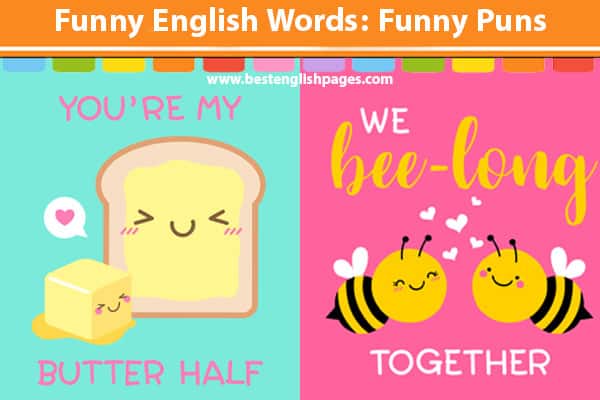
What Are Some Funny English Words for Students? Top 20 Funny English Words You Probably don’t know
- Brouhaha – An uproar or noisy response.
- Cantankerous – Bad tempered or grumpy.
- Pratfall – A fall on the buttocks or an embarrassing action.
- Anencephalous – Absence of a brain.
- Discombobulate – To confuse someone.
- Doozy – Something really good.
- Rambunctious – Uncontrollably excitable or exuberant.
- Lollygag – To dawdle or spend time aimlessly.
- Borborygmus – Stomach rumbling.
- Shenanigan – Silly behaviour.
- Skullduggery – Deception or trickery.
- Fartlek – A training system for runners.
- Gobbledygook – Meaningless or nonsensical language.
- Canoodle – Hugging and kissing.
- Klutz – A clumsy or foolish person.
- Lickety-split – As quickly as possible.
- Flummox – To perplex or bewilder.
- Crudivore – Someone who eats raw food.
- Mollycoddle – To treat someone leniently.
- Kerfuffle – A mild scandal, commotion or fuss.
What Are Some Funny English Words for Students? 24 Funny Anagrams
An anagram is a word, name, or phrase formed by transposing or rearranging the letters of another, using the original letters only once.
The funniest and best anagrams are the ones that could link the new word, name, or phrase to the original one in some way, such as when ‘silent’ becomes ‘listen’ or ‘meal for one’ becomes ‘for me alone’.
- below = elbow
- A gentleman = Elegant man
- meteor = remote
- Debit card = Bad credit
- meal for one = for me alone
- Eleven plus two = Twelve plus one
- older and wiser = I learned words
- Hot water = Worth tea
- young lady = an old guy
- Vacation time = I am not active
- conversation = voice rants on
- Conversation = Voices rant on
- The eyes = They see
- Schoolmaster = The classroom
- act = cat
- The country side = No city dust here
- Dormitory = Dirty room
- Astronomers = No more stars
- the classroom = schoolmaster
- The Detectives = Detect thieves
- video game = give a demo
- Mummy = My mum
- A decimal point = I’m a dot in place
- Clint Eastwood = Old west action
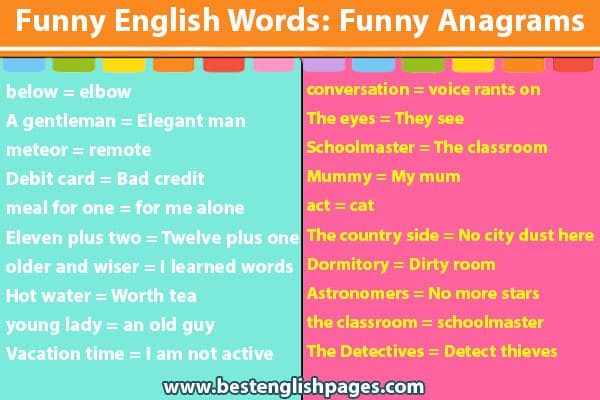
What Are Some Funny English Words for Students? 18 Funny Puns
Puns are a little play on words – a clever word joke with a double meaning. Puns are frequently used in literature and advertising and take advantage of words, or similar sounding words, with multiple meanings, often to create a humorous situation or joke. Puns can sometimes be created unintentionally.
- Shoes are required to eat in the restaurant. Socks can eat anywhere they like.
- Let’s talk about rights and lefts. You’re right, so I left.
- Time flies like an arrow. Fruit flies like a banana.
- When a clock is hungry it goes back four seconds.
- A boiled egg every morning is hard to beat.
- Two fish are in a tank. One says to the other, “Err…so how do you drive this thing?”
- I went to buy some camouflage trousers yesterday but couldn’t find any.
- I’ve been to the dentist many times so I know the drill.
- Every day is a gift that’s why we call it the present.
- Being struck by lightning is a shocking experience!
- Without geometry, life is pointless.
- Do hotel managers get bored with their jobs?”
- Two antennas met on a roof, fell in love and got married. The ceremony wasn’t much, but the reception was brilliant!
- A chicken crossing the road is truly poultry in motion.
- Two peanuts walk into a bar, and one is a·salted.
- The roundest knight at King Arthur’s table was Sir Cumference. He acquired his size from far too much pi.
- I went to a seafood disco last week….and pulled a mussel.
- She had a photographic memory but never developed it.
What Are Some Funny English Words for Students? 26 Nice Oxymoron Examples
An oxymoron is a figure of speech that uses contradictory words in conjunction, which means words that don’t appear to go well together.
A good example of an oxymoron comes from the debut album by English rock band Oasis, which is named ‘Definitely Maybe’.
- Act naturally
- Cruel kindness
- Almost exactly
- Alone together
- Clearly misunderstood
- Diet chocolate-cake
- Extinct Life
- Cool passion
- Freezer burn
- Good grief
- Exact estimate
- Living dead
- Awful good
- Minor catastrophe
- Working vacation
- Deliberate speed
- Near miss
- Passive aggressive
- Pretty ugly
- Sweet sorrow
- Festive tranquility
- Icy hot
- Small crowd
- Impossible solution
- Terribly pleased
- Genuine imitation
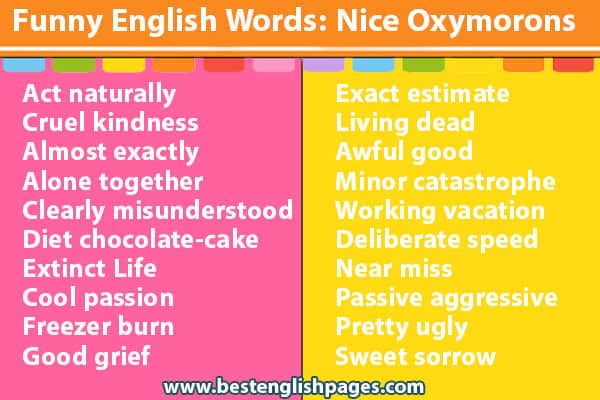
What Are Some Funny English Words for Students? 27 Palindromes Examples
Backward or forwards? It doesn’t really matter when we are talking about palindromes. In fact, Palindromes are words, phrases, or even numbers that can be read the same way, no matter the direction.
Words Palindromes Examples:
- Eye
- Pop
- Noon
- Level
- Radar
- Kayak
- Rotator
Longest Palindromic Words
- ‘Redivider’ is believed to be the longest palindromic word using common English.
- ‘Detartrated’ is a seldom used scientific word.
- ‘Tattarrattat’ was coined by writer James Joyce in a book called ‘Ulysses’.
- ‘Aibohphobia’ is a joke term used to describe the fear of palindromes.
Names Palindromes Examples:
- Eve
- Bob
- Otto
- Anna
- Hannah
Sentences Palindromes Examples:
- Evil olive.
- Mirror rim.
- Stack cats.
- Doom mood.
- Rise to vote sir.
- Step on no pets.
- Never odd or even.
- A nut for a jar of tuna.
- No lemon, no melon.
- Some men interpret nine memos.
- Gateman sees name, garageman sees nametag.
What Are Some Funny English Words for Students? The 100 Funniest Words in English
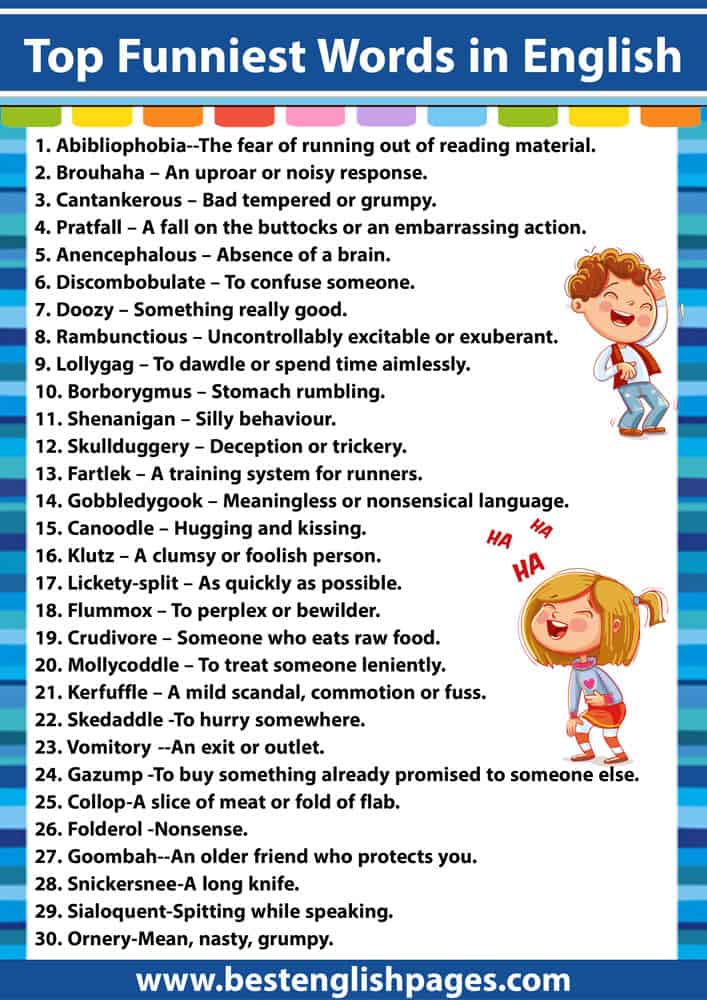
The Importance of Learning English
English is the language of international communication. With the rapid development of the Internet and the advent of ICT into every aspect of human life, English has become the modern lingua franca; that is, the means of gathering and spreading information, and the way to connect people all around the globe.
Therefore, The focus has shifted, from learning English as a second or foreign language to learning it as an international language. But why learn the English language?
- English is also the favored language of the world’s major airlines and international commerce.
- Over 80 percent of the world’s electronically stored information is in English.
- Over two-thirds of the world’s scientists read in English.
- English is an official language or has a special status in over 75 of the world’s territories.
- English is the main language of international business and academic conferences, science, technology, diplomacy, sport, international competitions, pop music and advertising
- Three-quarters of the world’s mail is written in English
- of the estimated 200 million users of the Internet, some thirty-six percent communicate in English
- Also, Speaking English has become more like a status symbol. All the companies are recruiting only those people who speak fluent and correct English.
Having a clear vision of how to start learning English as an ESL student is quite important. On the bestenglishpages.com website, we want to help learners to improve their English skills. Here, we try to make the process of learning English an interesting and enjoyable experience. learners and teachers of English will find a variety of engaging materials including lessons, worksheets, ESL posters and PDF, and plenty of other unique, useful, and high-quality content that cover many different categories, including grammar, writing, speaking as well as reading.
Vocabulary Builder Course
blubber (n.) and (v.)
As a noun, blubber refers to the thick layer of fat on whales and other marine animals – although some people also use it to refer to human body fat (especially if the person has a lot of fat!) As a verb, blubber means to cry noisily: “My five-year-old son was blubbering for hours after I took away his video game.”
debauchery (n.)
Extreme sensual pleasure (usually involving sex and/or alcohol) – “That film is full of debauchery; it’s definitely not appropriate for children.”
discombobulated (adj.)
Very confused and disorganized – “I was so discombobulated this morning that I put my car keys in the refrigerator!”
dollop (n.)
A quantity of a liquid or soft substance – “The apple pie was served with a dollop of ice cream on top.”
doodle (n.) and (v.)
To draw informally, casually – especially when you’re preoccupied with something else. – “I doodled in the margins of my notebook while the teacher was talking.”
doozy (n.)
Something extraordinary (usually in a good way, but could be in a bad way as well):
- The whole season was great, but the last episode was a doozy.
(a really amazing/memorable episode) - The truth has finally come out about the political scandal – and it’s a doozy.
(something really shocking)
dumbfounded (adj.) / flabbergasted (adj.)
Astonished (very surprised) to the point that it’s difficult to speak. – “I was flabbergasted when I heard that John and Debbie were going to get divorced – they had seemed like such a happy couple!”
feeble (adj.)
Weak; not strong. Can be used for physical or non-physical weakness. – “He made a feeble attempt to defend himself, but everyone knew he was guilty.”
festooned (adj.)
Decorated. – “The banquet hall was festooned with chains of red and white flowers.”
finagle (v.)
To get something by indirect (and maybe tricky) methods. – “Eric finagled an extra day off from work by telling his boss it was an religious holiday – even though he’s not religious at all!”
finicky (adj.)
Describes a person who is very particular and specific in what they want, and doesn’t accept things that aren’t exactly the way they want. – “My daughter is a finicky eater. She won’t eat her dinner if two of the foods on the plate are touching each other.”
flummoxed / befuddled (adj.)
Completely confused. – “The police were befuddled by the complete lack of evidence at the crime scene.”
fuddy-duddy (n.)
A negative word for an old-fashioned person who does not accept modern trends. – “Maybe it makes me a fuddy-duddy, but I really don’t think mini-skirts are acceptable for job interviews.”
gargoyle (n.)
A statue of an animal or imaginary creature, often used in architecture to send rainwater away from the walls of the building.
giggle (v.)
To laugh with high-pitched, short sounds – like a little girl.
gobbledygook / gibberish (n.)
Words that don’t make any sense and you can’t understand them. “My one-year-old nephew can say a few words, but most of what comes out of his mouth is gibberish.”
goggles (n.)
A type of thick protective glasses, to protect your eyes from danger. You can use goggles for swimming. Scientists also use goggles in the laboratory.
haphazard (adj.)
Dependent on chance, not well-organized or planned. “You’ll never be rich if you keep spending your money haphazardly.”
hodgepodge (n.)
A mix of random items of various types. – “This drawer contains a hodgepodge of office supplies – staples, clips, post-it notes, pencils, etc.”
hogwash (n.)
A negative term for describing facts, information, or beliefs that are ridiculous or false. – “Some people believe it’s unlucky to break a mirror, but I think that’s a bunch of hogwash.”
hoodwink (v.)
To deceive. – “The entrepreneurs hoodwinked investors by presenting the company as being more profitable than it actually was.”
hubbub / hullabaloo / ruckus (n.)
Loud noise from a confusion or agitated event. – “I looked out the window to find out the cause of the ruckus, and saw a bunch of teenagers having a party across the street.”
itty-bitty (adj.)
Informal word for “very small” – often used when talking with children. – “Look at the itty-bitty ladybug!”
pompous (adj.)
Arrogant. – “My last boss was a pompous jerk who thought he was superior to everyone else.”
rambunctious (adj.)
Describes a person (or animal) with a lot of energy, who tends to cause problems or make messes. – “I don’t know how Linda stays sane with five rambunctious kids under the age of ten.”
ramshackle (adj.)
Badly constructed, so that it is likely to fall apart. – “We crossed the river on a ramshackle bridge.”
shenanigans (n.)
Mischief, tricks, or problematic activities. – “George’s shenanigans got him into trouble at school.”
shrubs / shrubbery (n.)
Bushes – plants that grow thick vegetation and are close to the ground. – “The walkway to our house is lined with shrubbery.”
skedaddle (v.)
An informal word for leaving or running away. – “The neighborhood boys skedaddled after breaking a window with a baseball.”
squabble (n.) and (v.)
An argument or fight, usually over something small. – “The company’s president and vice-president are squabbling over the color of the business’ new logo.”
squeegee (n.)
A T-shaped tool used to remove water from windows and floors:
squelch (v.)
To suppress or inhibit: “This new medicine can squelch anxiety and boost your confidence.”
wishy-washy (adj.)
Describes a person who is weak in their decisions or character. – “My ex-boyfriend was so wishy-washy, he couldn’t even choose what movie to watch on a Friday night.”
В статье разобрали синонимы слова funny в английском языке. Прочитав ее, вы сможете подобрать подходящее прилагательное, чтобы описать любую забавную ситуацию.
Содержание:
- 1. Выражения со словом funny
- 2. Синонимы слова funny: comic и comical
- 3. Синоним слова funny: humorous
- 4. Синонимы слова funny: witty и hilarious
Уильям Сомерсет Моэм говорил: «Немного здравого смысла, немного терпимости, немного чувства юмора — и можно очень уютно устроиться на этой планете». А ведь это действительно так: юмор помогает нам идти по жизни с улыбкой и учит нас смеяться не только над другими ситуациями и людьми, но и над самими собой. Мы подготовили статью, посвященную юмору — синонимам к слову funny.
Слово funny переводится на русский язык как «смешной» и считается более распространенным прилагательным по сравнению с другими похожими по значению.
He’s told me a very funny story. — Он рассказал мне очень смешную историю.
There’s nothing funny about it. — В этом нет ничего смешного.
Однако под словом funny американцы и британцы подразумевают не только нечто смешное или забавное, но и нечто странное и непонятное.
This salad tastes a bit funny. Are all the ingredients fresh? — У этого салата немного странный вкус. Все ингредиенты свежие?
Melissa had a funny feeling that something terrible was going to happen. — У Мелиссы было странное чувство, что сейчас произойдет что-то ужасное.
Рассмотрим самые распространенные словосочетания и идиомы с funny.
| Словосочетание/Фраза | Перевод | Пример |
|---|---|---|
| funnily enough | как ни странно | Funnily enough, my sister was born exactly on the same day as her husband. — Как ни странно, моя сестра родилась в тот же день, что и ее муж. |
| It’s not (even) funny! | Это (даже) не смешно! | It’s not funny, Mark! She cried her eyes out after that incident. — Это не смешно, Марк! Она выплакала все глаза после того случая. |
| It’s funny (that)… | Забавно, (что)… | It’s funny that they got divorced after two weeks. — Забавно, что они развелись спустя две недели. |
| a funny farm | психиатрическая лечебница, дурдом | If things get worse, they will definitely send him to a funny farm. — Если дела пойдут еще хуже, его обязательно отправят в психушку. |
| funny money | фальшивые деньги;
деньги, добытые нечестным путем |
The guy paid for the food in the supermarket with a forged $100 note, so the police had to issue a warning about funny money. — Парень заплатил за еду в супермаркете поддельной банкнотой в 100$, поэтому полиции пришлось вынести предупреждение о фальшивых деньгах.
Many presidential candidates were accused of using funny money in their political campaigns. — Многие кандидаты в президенты обвинялись в использовании нечестно заработанных денег в своих политических кампаниях. |
| the funny papers, the funnies | раздел комиксов в газете | Every Sunday my dad would sit in his armchair and laugh at the funny papers. — Каждое воскресенье папа сидел в кресле и смеялся над комиксами в газете. |
| to go funny | становиться странным/непонятным | Mike switched on his laptop, and the screen went all funny. — Майк включил свой ноутбук, и на экране появилось что-то странное. |
| Very funny! | Очень смешно! | Very funny, guys! Who took my wallet? — Очень смешно, ребята! Кто взял мой кошелек? |
| to give (somebody) a funny look | странно (на кого-то) посмотреть | Robert gave me a funny look when he saw what I was doing. — Роберт странно посмотрел на меня, когда увидел, чем я занимаюсь. |
| funny little something | что-то маленькое и забавное | There were so many funny little houses in the city center that I couldn’t take my eyes off them. — В центре города было так много маленьких забавных домиков, что я не мог оторвать от них глаз. |
| I’m not being funny (but)… | Я не шучу (но)… ;
Ничего личного (но)… |
I’m not being funny, I’m going home. — Я не шучу, я собираюсь домой.
I’m not being funny, but your dress looks like hand-me-downs. — Ничего личного, но твое платье похоже на обноски. |
| not (even) remotely funny | вообще не смешно | Jack told everyone a joke which was not even remotely funny. — Джек рассказал всем анекдот, который был вообще не смешным. |
| not to do funny | не уметь шутить | — Hey, pal, you were on fire yesterday. You were really funny. — Funny? I don’t do funny. — Эй, приятель, вчера ты был в ударе. Шутки были очень смешными. — Смешными? Я не умею шутить. |
| A rich man’s joke is always funny. | Шутки хозяина всегда смешнее. | — Mr Jones, the richest trader in the US, told us a story from his childhood which wasn’t very funny, but all the people around started laughing. — Yeah, sure. A rich man’s joke is always funny. — Мистер Джонс, самый богатый трейдер в США, рассказал нам историю из своего детства, которая была не очень смешной, но все вокруг начали смеяться. — Ну да, конечно. Шутки хозяина всегда смешнее. |
| (as) funny as a crutch | ничего смешного | Do you think your joke was funny? It was as funny as a crutch! — Ты думаешь, твоя шутка была смешной? Ничего смешного! |
| funny in the head | не все в порядке с головой, тараканы в голове | You should avoid this teacher; he seems a little funny in the head. — Ты лучше избегай этого учителя. У него с головой не все в порядке. |
| The funny thing is (that)… | Забавно (что)… / Самое смешное (что)… | I’d spent so much money on the Christmas decorations, but the funny thing is that all of them got broken right after the holidays. — Я потратила столько денег на рождественские украшения, но самое смешное, что все они сломались сразу после праздников. |
| too funny for words | смешно до слез, обхохочешься | The film was too funny for words! You should watch it, too. — Фильм был смешным до слез! Тебе тоже стоит посмотреть его. |
| to have a funny feeling | подозревать, что, сдается (мне), что | I have a funny feeling that signing a contract with this company will not be in our favour in the end. — Сдается мне, если мы подпишем контракт с этой компанией, в конечном итоге это обернется не в нашу пользу. |
| to quit the funny stuff | перестать баловаться/шутить/прикалываться (используется в повелительном наклонении) | Alright children, quit the funny stuff and start reading. — Ладно, дети, прекратите баловаться и начинайте читать. |
| to strike someone (as) funny | казаться кому-то забавным/смешным | Richard didn’t know why, but picturing himself married to this woman struck him as very funny. — Ричард не знал почему, но мысль о том, что он может быть женат на этой женщине, показалась ему очень забавной. |
| to see the funny side (of something) | увидеть смешную/забавную сторону (в чем-то), посмотреть (на что-то) с юмором | I know you’ve been working hard to get promoted but they’ve picked Billy for this position. You’ve got to see the funny side of this situation — you won’t have to work with Billy anymore. — Я знаю, что ты много работал, чтобы получить повышение, но они выбрали Билли на эту должность. Посмотри на эту ситуацию с юмором — тебе больше не придется работать с этим Билли. |
| to tickle someone’s funny bone | позабавить, рассмешить | Sarah is a fun girl. She can tickle anyone’s funny bone. — Сара — веселая девчонка. Она может рассмешить любого. |
Синонимы слова funny: comic и comical
Частичным синонимом слова funny выступает прилагательное comic, которое означает «комический», «комедийный», «юмористический».
In school, we used to read a lot of comic novels written by famous writers. — В школе мы читали много юмористических повестей известных писателей.
What’s your favorite comic actress? — Какая твоя любимая комедийная актриса?
В английском языке сложилось немного устойчивых выражений с прилагательным comic. Стоит уделить внимание такой фразе, как comic relief, которая используется для обозначения смешного эпизода в грустном фильме, книге или ситуации, позволяющих расслабиться на короткое время. В Великобритании даже существует благотворительная организация под названием Comic Relief, которая была основана в 1985 году профессиональными артистами-комиками. Каждые два года эта организация устраивает сбор средств. Этот день получил название Comic Relief Day. Многие люди, которые поддерживают деятельность организации Comic Relief, в этот день покупают накладные красные носы, как у клоунов. Отсюда и второе название события — Red Nose Day.
Другие выражения с прилагательным comic вы можете изучить в следующей таблице.
| Слово/Словосочетание | Перевод | Пример |
|---|---|---|
| a comic strip/book | комикс | She came up with a very funny story and created a real comic strip. — Она придумала очень смешную историю и создала настоящий комикс. |
| a comic novel | юмористическая повесть | Would like to read a comic novel about the difficulties of being different? — Хочешь прочитать юмористическую повесть о том, как трудно приходится тем, кто отличается от других? |
| a comic writer | писатель-юморист, автор комедий | As a child, I always wanted to become a comic writer, but things have changed since then. — В детстве я всегда хотел стать писателем-юмористом, но с тех пор многое изменилось. |
| a comic actress | комедийная актриса | Catherine O’Hara was a popular comic actress in the 80s and 90s. — Кэтрин О’Хара была популярной комедийной актрисой в 80-е и 90-е годы. |
| a darkly comic look at something | черно-комедийный взгляд на что-либо, видение чего-либо | The show, which is going to be aired soon, is a darkly comic look at family relationships. — Шоу, которое скоро выйдет в эфир, представляет собой черно-комедийный взгляд на семейные отношения. |
| a comic genius | гениальный комик | No one knows what’s the source of Charlie Chaplin’s comic genius. — Никто не знает, в чем же источник гениальности комика Чарли Чаплина. |
| a comic magazine | журнал комиксов, юмористический журнал | I’ve just bought a fantastic comic magazine. — Я только что купил потрясающий журнал комиксов. |
| a comic figure | комический персонаж | Mr Pickwick is regarded as one of the greatest comic figures in English literature. — Мистер Пиквик считается одним из величайших комических персонажей английской литературы. |
Слово comic многие путают с прилагательным comical (потешный, забавный), забывая, что суффиксы -ic и -ical в прилагательных придают им разные значения. Если comic обозначает комедийный жанр (фильмов, книг, шоу-программ), то comical характеризует нечто смешное или забавное.
I watched the comic play which you recommended to me the other day. It was really comical. — Я посмотрел на днях юмористическую пьесу, которую вы мне рекомендовали. Она действительно смешная.
Когда мы говорим про забавную картинку или карикатуру на что-либо, можно использовать английское словосочетание a comical picture.
She’s drawn a nice comical picture of a medieval town. — Она нарисовала славную карикатуру средневекового города.
Синоним слова funny: humorous
Еще одним синонимом слова funny можно считать прилагательное humorous, которое означает «смешной», «забавный», «юмористический».
The book takes a humorous look at the friendship between a man and a woman. — В книге присутствует юмористический взгляд на дружбу между мужчиной и женщиной.
When I first met my husband, he was quite humorous. It was the thing that I liked about him at that very moment. — Когда я впервые встретила своего мужа, он был довольно забавным. Именно это мне и понравилось в нем в тот момент.
С прилагательным humorous вы можете встретить следующие словосочетания.
| Слово/Словосочетание | Перевод | Пример |
|---|---|---|
| in a humorous vein | в юмористическом ключе | The writer described her main character in a mildly humorous vein. — Писательница описала свою главную героиню в слегка юмористическом ключе. |
| a humorous story | юмористический рассказ, смешная/забавная история | My boss advised me to open my presentation with a humorous story which will be somehow related to the topic. — Мой босс посоветовал мне начать презентацию с забавной истории, которая будет так или иначе связана с темой. |
| a humorous style | юмористический стиль | She’s written a book which is aimed at popularizing a humorous style. — Она написала книгу, которая направлена на популяризацию юмористического стиля. |
| a humorous writer | писатель-юморист | The teacher told us to read one story by any humorous writer. — Учитель сказал нам прочесть один рассказ любого писателя-юмориста. |
Синонимы слова funny: witty и hilarious
Когда речь идет о чем-либо смешном и остроумном, следует использовать прилагательное witty (остроумный).
Our boss is a witty person and a source of inspiration to all his employees. — Наш босс — остроумный человек и источник вдохновения для всех своих сотрудников.
В таблице вы найдете словосочетания с прилагательным witty.
| Слово/Словосочетание | Перевод | Пример |
|---|---|---|
| a witty ditty | частушка, смешная песенка | I’ve never heard this witty ditty before but it is definitely amusing. — Я никогда раньше не слышал эту частушку, но она определенно забавная. |
| witty in content | остроумный по содержанию | The story which she has written is quite witty in content. — История, которую она написала, весьма остроумна по содержанию. |
| a witty remark | остроумное замечание | Having listened to John’s speech, she made a witty remark. — Выслушав речь Джона, она сделала остроумное замечание. |
| witty repartee | остроумный ответ | Professor Morgan was shocked by the witty repartee which he heard from me — the student who had been absent from all his classes. — Профессор Морган был потрясен остроумным ответом, который он услышал от меня — студента, отсутствовавшего на всех его занятиях. |
| a witty talk | веселая болтовня, шутки, остроумные речи | Miss Blumenstal kept him amused with her witty talk. — Мисс Блюменталь развлекала его своей веселой болтовней. |
Чтобы рассказать о невероятно смешной ситуации, используйте другой синоним funny — hilarious (уморительный, очень смешной).
There were several hilarious scenes in the film. We couldn’t help laughing. — В фильме было несколько уморительных сцен. Мы не могли удержаться от смеха.
Прилагательное hilarious нельзя использовать со словом very (очень), однако его можно употреблять с наречием absolutely (абсолютно, совершенно).
My mom gave me her favorite book to read. It’s absolutely hilarious! — Мама дала мне почитать свою любимую книгу. Она невероятно смешная!
Два интересных словосочетания с использованием слова hilarious можно увидеть в следующей таблице.
| Слово/Словосочетание | Перевод | Пример |
|---|---|---|
| hilarious in hindsight | тот, что со временем становится еще смешнее | His books are hilarious in hindsight. — Его книги со временем становятся все более смешными. |
| a hilarious celebration | веселый праздник, шумное празднование | My kids have passed all the exams. This calls for a hilarious celebration! — Мои дети сдали все экзамены. Это требует веселого праздника! |
Научиться использовать эту и другую лексику в общении вы сможете на групповых уроках с преподавателями клуба Skills.
Теперь вы можете смело употреблять синонимы слова funny, рассказывая о смешных случаях из жизни. Делитесь хорошим настроением на английском языке!
Скачать список выражений по теме «Синонимы funny: comic, humorous, witty и другие» (*.pdf, 131 Кб)
© 2023 englex.ru, копирование материалов возможно только при указании прямой активной ссылки на первоисточник.
Learn different ways to say funny in English. It will help you to broaden your vocabulary, to have different ways to say the same thing.
When you’re writing or even when you’re speaking to people, you shouldn’t use the same word over and over again.
And if you’re preparing for IELTS or another type of English examination, then it’s really really important to have a wider vocabulary. So when you’re writing an essay, you’re not repeating the same word in the first paragraph, the second paragraph and so on.
Hopefully, with these exercises, I’ll give you a little bit of encouragement to help you to use different words.
Table of Contents
Harry
Harry is a native English teacher with over 10 years of experience both online and in face-to-face lessons. With his extensive experience in business, he specialises in Business English lessons but happily teaches ESL students with any English learning needs.
Other ways to say funny in English

Hi, there this is Harry and welcome back to my advanced English lessons.
Today, I’m going to talk to you about the word ‘funny’ and different ways to say funny in English.
Intermediate to Advanced English Marathon
INSANITY: doing the same thing over and over again and expecting different results.
- What you’ll learn:
- better understanding of more complex grammar structures
- advanced English vocabulary words
- British & American slang
- perfect your listening skills through practing different accents
- This marathon is for you if you’re:
- stuck at an intermediate English level
- tired of confusing explanations
- a mature student
- shy & introverted
Let’s take the first one then:
amusing
Meaning: amusing is funny, but not something that is side-splitting, not the best joke you’ve ever heard, or the funniest story you’ve ever read
Examples:
He found the story amusing and would occasionally break into laughter.
Overall, I found the book amusing and fun; definitely worthwhile picking up.
The next word is
hilarious
Meaning: this is really really funny; a little bit higher level than amusing
Examples:
I found the joke hilarious and wanted to share it with everybody.
The story Adam told us was hilarious.
The first movie was hilarious, and I couldn’t wait to see the second one.
Different ways to say funny
Share and help other students to improve English language skills.
The next we have the word
witty
Meaning: witty is funny but in a smart or clever way; you might laugh
Example:
I love his witty remarks, but they are not always kind.
Somebody clever and smart with words would be described as witty.
The next word is
comical
Meaning: quite funny and amusing
Example:
If you get stuck in an elevator with your boss, the situation could be quite comical.
I kept reading and found that the story was comical right to the end.
book your trial English Lesson
The next word is
humorous
Meaning: quite funny, a bit like comical
Examples:
Come here I’ll tell you a funny story. I’m sure you’ll find it humorous.
The photographer captured the humorous looks between me and two of my best male friends on the table next to us.
The next word I have is
wacky
Meaning: funny, but on the odd side of funny; it’s not the same as everybody
Example:
The faces Jim Carrey makes in “The Mask” are really wacky.
Another word to describe funny is the word
droll
Meaning: witty, unusual, mildly funny, but a little bit strange
Someone with a dry sense of humour.
Example:
Adam has a dry sense of humour and often makes droll remarks with a quiet smile.
The running commentary was informative and amusingly droll.
Other ways to say funny
When you check out the word funny, and you’re looking for synonyms, you probably come up against the word
entertaining
Now, in itself, ‘entertaining’ doesn’t necessarily mean it’s funny. There are lots of things in life that are entertaining, but they’re not necessarily funny.
You can go to the movies and it can be entertaining but it might be a thriller or it could be a love story, so it’s not really funny.
Or you could go to the circus and the clowns can be funny but the rest of the show can be just entertaining.
It is a synonym that people use when they’re talking about ‘funny’.
Funny is entertaining.
But everything entertaining isn’t necessarily funny.
So you have to distinguish between both funny and entertaining.
If you’re listening to a comedy show, I’m sure you’ll find it very very entertaining and hopefully you will laugh. Particularly if there are new comics with new stories.
Other ways to say funny
An expression we often hear when we talk about something that’s funny
sidesplitting
Meaning: literally I split my sides laughing; really funny, you can’t stop laughing
Example:
Honestly, his show was sidesplitting. I think I went to bed still laughing.
Another expression we often hear when we talk about something amusing or something funny is
I burst out laughing
Meaning: you just can’t stop yourself and suddenly start laughing
Example:
The situation was comical and I tried hard to keep a straight face and not to burst out laughing.
Other ways to say funny
The final expression I have for you is
it cracks me up
Or it cracked me up. This is an expression you hear in British English all the time.
Meaning: something or somebody that makes you laugh a lot
Example:
I love ‘Only Fools and Horses’, these guys really crack me up. If you watch the programme, they’ll probably crack you up as well.
So these are some different ways to say funny in English. So now you can improve your vocabulary, and you don’t have to use the same word all the time.
So you have to do a bit of practising. Let me give them to you one more time
- it is/was amusing
- hilarious
- witty
- comical
- humorous
- wacky
- droll
- entertaining
- side-splitting
- I burst out laughing
- it cracks me up
Thanks for listening and, as always, remember to subscribe to my channel and join me again soon.
More information
You will love these English lessons
Useful English Collocations
English Grammar
English Vocabulary


